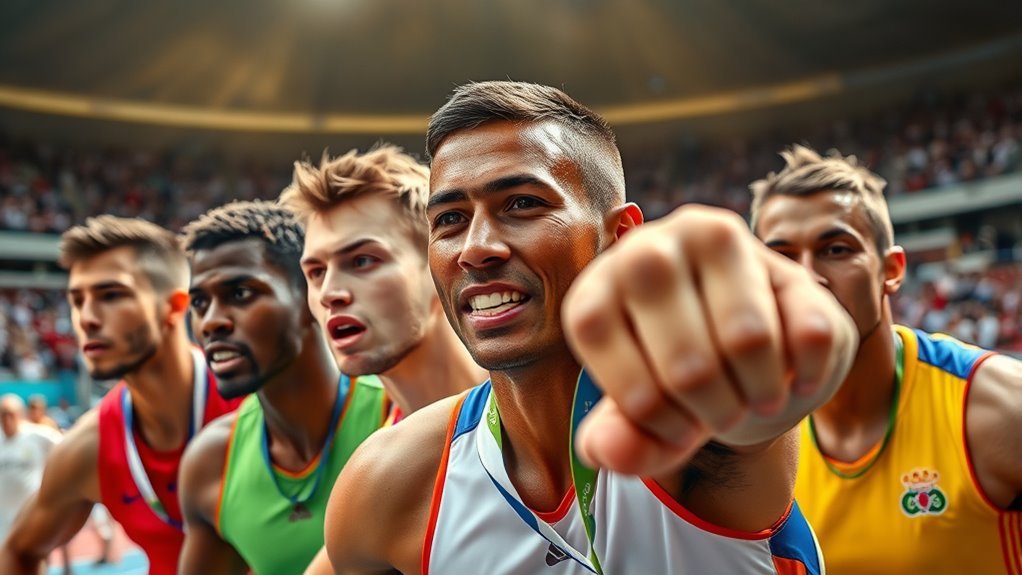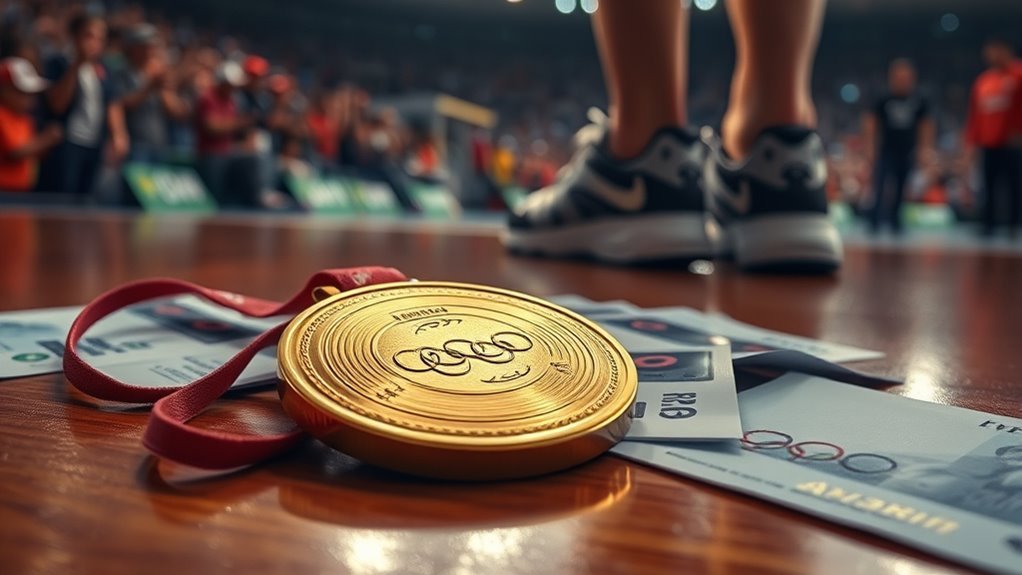Athletes should be paid fairly due to the immense physical demands they face, risking injuries while dedicating their lives to training. They generate significant revenue for the sports industry through sponsorships, ticket sales, and merchandise. Despite these contributions, many athletes struggle with long-term health risks and inadequate compensation, especially women in sports. Recognizing their efforts promotes equality and respect. If you’re curious about how these factors shape the sports world, there’s more to explore.
The Physical Demands of Professional Sports
When you think about professional athletes, it’s easy to focus on their fame and fortune, but the physical demands of their sports are immense. You might not realize the grueling training intensity they endure daily, pushing their bodies to the limit. Every workout is a test of endurance, strength, and willpower, all while facing relentless performance pressure to deliver results. Injuries can happen at any moment, and the risk of burnout is real. Athletes often sacrifice their freedom, dedicating countless hours to perfecting their craft. They battle through pain, fatigue, and psychological strain, all in pursuit of excellence. Understanding these challenges helps you appreciate why athletes deserve fair compensation for the sweat and sacrifices they make in their pursuit of greatness. Quality sleep is essential for their recovery and overall performance, ensuring they can meet the high demands placed upon them.
The Financial Landscape of the Sports Industry
As the sports industry continues to grow exponentially, it’s essential to understand the financial dynamics that shape it. The revenue generated isn’t just numbers; it’s about the freedom athletes deserve. Here are four key components driving this landscape:
Understanding the financial dynamics of the sports industry is crucial for ensuring athletes receive the freedom they deserve.
- Sponsorship deals – These partnerships can bring in millions, showcasing the value placed on athletes.
- Media rights – Broadcast agreements fuel the industry, filling stadiums and enriching teams.
- Merchandising – Fans enthusiastically buy jerseys and memorabilia, proving their loyalty and support.
- Ticket sales – Packed venues reflect the passion of fans and the financial stakes at play.
Recognizing these elements highlights why athletes should be compensated fairly, allowing them the freedom to thrive in their careers. Additionally, adequate hydration strategies are crucial for athletes to maintain peak performance, further emphasizing the need for fair compensation in the industry.
The Impact of Injury and Long-Term Health Risks
In a world where athletic performance is celebrated and monetized, the harsh reality of injuries and long-term health risks often lurks beneath the surface. You might chase glory on the field, but injuries can derail your dreams and affect your future. Injury rehabilitation is a grueling process, often requiring extensive time and resources. Yet, many athletes find themselves without adequate health insurance, facing mounting medical bills while their careers hang in the balance. This lack of financial support leaves you vulnerable to lifelong consequences. Athletes deserve compensation that reflects not just their current contributions but also the sacrifices made for the sport. By acknowledging these risks, we can advocate for fair pay and better health protections for those who entertain and inspire us. Additionally, understanding the prevalence of common sports injuries can help highlight the urgent need for better health coverage and support systems for athletes.
The Role of Athletes in Driving Revenue
Athletes are the lifeblood of the sports industry, driving massive revenue through their performances and public personas. Without them, the excitement and passion that fuel this world would fade. Think about how much athletes contribute:
Athletes are essential to the sports industry, igniting passion and generating substantial revenue through their incredible performances.
- Sponsorship deals: They attract brands enthusiastic to connect with their fan base.
- Merchandise sales: Fans flock to buy jerseys, gear, and memorabilia, boosting team profits.
- Ticket sales: Crowds come alive, filling stadiums and arenas, contributing to local economies.
- Media rights: Networks pay big bucks to broadcast games, all thanks to the athletes who make it thrilling.
Additionally, the performance insights athletes provide through their hard work and dedication inspire countless individuals to pursue their own fitness goals. When you see the financial impact they create, it’s clear: athletes deserve fair compensation for their invaluable contributions to the sports industry.
The Importance of Fair Compensation for All Athletes
The financial success of the sports industry largely hinges on the contributions of its athletes, yet not all of them receive fair compensation for their efforts. You need to recognize that equity issues plague the world of sports, particularly when it comes to gender disparities. Female athletes often earn considerably less than their male counterparts, despite similar levels of skill and dedication. This isn’t just a matter of fairness; it’s about respecting the hard work and passion that all athletes bring to their games. When you advocate for fair compensation, you’re promoting a culture of equality and respect. Every athlete deserves to be valued for their contributions, ensuring they can pursue their dreams without financial barriers holding them back.
Frequently Asked Questions
How Do Athletes’ Endorsements Affect Their Overall Earnings?
Athletes’ endorsement deals and brand partnerships greatly boost their overall earnings. These collaborations often bring in more money than their salaries, allowing you to see how influential they can be. When you think about it, the right partnership can elevate an athlete’s brand, leading to even more lucrative opportunities. This freedom to choose endorsements lets athletes maximize their income potential, turning their talent and popularity into substantial financial rewards.
What Are the Average Salaries for Different Sports?
Basketball salaries can soar into the millions, while football salaries often reflect a shorter career span. Baseball salaries typically offer long-term contracts, contrasting with hockey salaries that vary widely. Soccer salaries are rising globally, and tennis salaries showcase prize money as a key factor. Golf salaries can be substantial, especially for top players, while boxing salaries depend heavily on individual fights. With diverse earnings across sports, you’ll see freedom in the financial landscape athletes navigate.
How Does Gender Impact Athlete Compensation?
Gender greatly impacts athlete compensation, creating a stark gender disparity in pay equity. You might notice that female athletes often earn considerably less than their male counterparts, despite similar talent and dedication. This imbalance reflects societal attitudes and outdated perceptions about women’s sports. Advocating for fair compensation can help bridge this gap, empowering female athletes and promoting equality. By supporting pay equity, you’re contributing to a more just and inclusive sporting world.
What Happens to Athletes’ Earnings After Retirement?
When the dust settles on an athlete’s career, their earnings can take a hit. If you haven’t planned wisely, retirement savings might dwindle quickly. However, many athletes find post-career opportunities that can keep them afloat, like coaching, broadcasting, or business ventures. It’s essential to stay savvy and invest in your future during your playing days, ensuring you’ve got a solid foundation when it’s time to hang up those cleats for good.
How Do College Athletes Compare in Pay to Professional Athletes?
College athletes usually earn a fraction of what professional athletes make, leading to significant pay disparities. While college sports generate massive revenue, players often receive limited compensation, primarily through scholarships. You might find it frustrating that these athletes risk their health and future for a school’s profit without seeing fair pay. In contrast, professional athletes negotiate contracts worth millions, highlighting the inequality in the sports industry that many are now trying to address.




